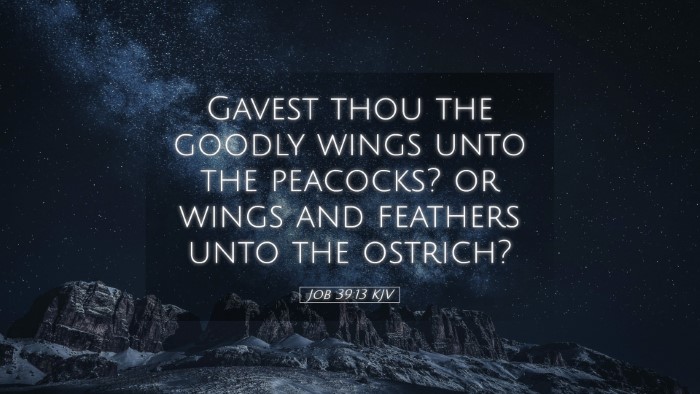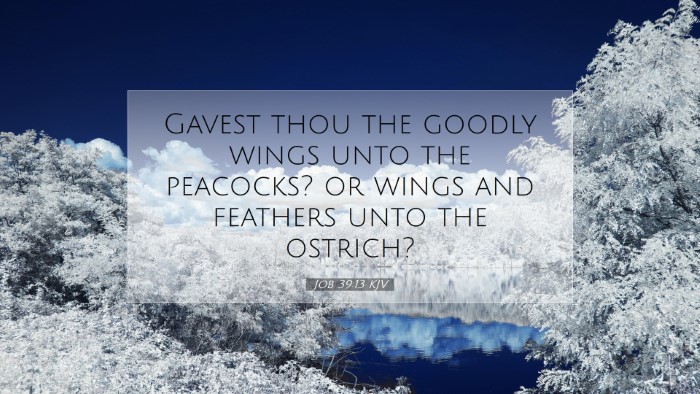Old Testament
Genesis Exodus Leviticus Numbers Deuteronomy Joshua Judges Ruth 1 Samuel 2 Samuel 1 Kings 2 Kings 1 Chronicles 2 Chronicles Ezra Nehemiah Esther Job Psalms Proverbs Ecclesiastes Song of Solomon Isaiah Jeremiah Lamentations Ezekiel Daniel Hosea Joel Amos Obadiah Jonah Micah Nahum Habakkuk Zephaniah Haggai Zechariah MalachiJob 39:13
Job 39:13 KJV
Gavest thou the goodly wings unto the peacocks? or wings and feathers unto the ostrich?
Job 39:13 Bible Commentary
Commentary on Job 39:13
In the Book of Job, Chapter 39, verse 13, we encounter a profound inquiry into the nature of creation and the divine order established by God. This verse reads, "The wings of the ostrich wave proudly, but are her wings and pinions like the kindly storks?" (Job 39:13, NKJV). In this commentary, we will delve into the significance of this verse, drawing insights from renowned public domain commentaries by Matthew Henry, Albert Barnes, and Adam Clarke.
Contextual Background
The Book of Job is a poetic dialogue between Job, a man suffering immense loss, and his friends, who represent various theological perspectives on suffering and divine justice. Chapters 38-41 are particularly critical as they reveal God's response to Job's lamentations. Here, God speaks to Job out of the whirlwind, highlighting His omnipotence and the marvels of creation.
Verse Analysis
Job 39:13 asks a rhetorical question about the ostrich, which serves multiple purposes in the larger context of God's discourse. The ostrich is depicted as an animal that possesses impressive physical capabilities but is also characterized by apparent deficiencies.
Matthew Henry's Commentary
Matthew Henry provides an insightful perspective by emphasizing the contrast between the ostentation of the ostrich's wings and its inability to fly. He notes that the proud waving of the wings symbolizes a false sense of grandeur. The text implies that while the ostrich may exhibit outward strength and beauty, it lacks the essential functionality of flight, which storks possess. This serves as an allegory for humanity, suggesting that external appearances can be deceptive and that true value lies in one's abilities and purpose in the divine order.
Albert Barnes' Perspective
Albert Barnes elaborates further on the nature of the ostrich. He points out that the ostrich's wings are not designed for flight but are rather adapted for running. This observation is significant when considering the broader theme of God's creations fulfilling their intended purposes. Barnes indicates that the ostrich's limitations should not lead to disdain but rather to an appreciation of the diversity and specialization found in God's creations. The query posed by God challenges Job to recognize that every creature is made with specific qualities that fit their niche in the ecosystem, underscoring the wisdom of God in His design.
Adam Clarke's Insights
Adam Clarke offers additional insight into the cultural and historical context regarding the ostrich. He notes that in ancient times, the ostrich was not only a physical creature but also carried symbolic meanings within various cultures. Clarke reflects on the pride associated with the ostrich's behavior and connects it to human tendencies toward vanity and boasting. He underscores that God’s questioning serves as a reminder of the limitations of pride and the folly of elevating oneself without the corresponding capabilities.
Theological Implications
The theological implications of Job 39:13 are profound. This verse invites readers to contemplate the nature of God's creation and to recognize that every aspect of the world—both the extraordinary and the seemingly deficient—serves a purpose in the divine plan. The rhetorical nature of the verse encourages believers to embrace humility in the face of God's vast wisdom.
Humility Before Divine Wisdom
- God's Sovereignty: Believers are reminded of God's absolute sovereignty over creation. Just as the ostrich's design serves a purpose, so do all aspects of life, often beyond human comprehension.
- Value of Diversity: Each creature plays a unique role in God’s creation, reflecting His glory in various ways. There is beauty in diversity, as God intentionally creates each being with strengths and weaknesses.
- Warning Against Pride: The ostentation of the ostrich's wings serves as a caution against excessive pride. It encourages reflection on our own limitations and the importance of aligning ourselves with God's will.
Lessons for Pastors and Theologians
For pastors, this verse offers rich material for preaching about the complexities of creation and the need for humility. It can serve as a reminder that in the church, members have varied gifts and callings, just as creatures in nature have different purposes. Effective ministry recognizes and values these differences.
Theologians can draw from this text for discussions on anthropomorphic language in scripture, the interplay between creation and divine intent, and the nature of God’s relationship with humanity and the natural world. This verse specifically encourages scholars to inquire deeply into how God utilizes both the powerful and the seemingly weak within His creation to accomplish His purposes.
Conclusion
Job 39:13 serves as a powerful reminder of God’s creative wisdom, the diversity of His creation, and the call to humility. As we reflect on the ostrich and its wings, we are invited to look beyond mere appearances and to seek understanding of the divine purposes woven throughout the tapestry of life. Recognizing that each element of creation plays a role in God's grand design allows for deeper appreciation and stewardship of the world He has created.


